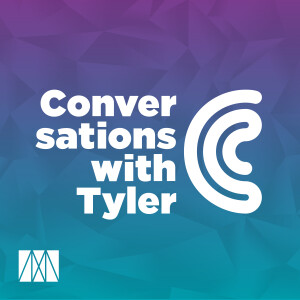How do you go about writing a book on an era that is, for many, recent history? When Chuck Klosterman set out to write his new book, The Nineties, he wasn’t interested in representing it as a misremembered era or forcing a retrospective view into modern ideology. Rather than finding overlooked signposts that signaled events to come, he says, he wanted to capture what it actually felt like to experience that time – the anxiety and excitement around scientific and technological progress, what it was like to be limited to a few cassette tapes or CDs at a time, the physical media and musical subcultures that would later evaporate with the advent of the internet. Though easier to research than more ancient history, complications arose when he pondered the bifurcation of his audience between those for whom the release of Nevermind is a personal memory and those for whom it’s as distant as the moon landing. Would he have to explain to readers what a compact disc is?
Chuck joined Tyler to discuss the challenges of writing about recent history, the “slow cancellation of the future” that began in the aughts, how the internet widened cultural knowledge but removed its depth, why the context of Seinfeld was in some ways more important than its content, what Jurassic Park illustrates about public feelings around scientific progress in the ‘90s, why the ‘90s was the last era of physical mass subcultures, why it’s uncommon to be shocked by modern music, how his limited access to art when growing up made him a better critic, why Spin Magazine became irrelevant with the advent of online streaming, what made Grantland so special, what he learned from teaching in East Germany, the impact of politics on the legacies of Eric Clapton and Van Morrison, how sports often rewards obnoxious personalities, why Wilt Chamberlain is still underrated, how the self-awareness of the Portland Trail Blazers undermined them, how the design of the NFL makes sports rivalries nearly impossible, how pro-level compensation prevents sports gambling from corrupting players, why so many people are interested in e-sports, the unteachable element of writing, why he didn’t make a great editor on his school paper, what he’d say to a room filled with ex-lovers, the question he’d most like to ask his parents, his impressions of cryptocurrency, why he’s trying to focus on what he has in the current moment rather than think too much about future plans, the power of charisma, and more.
Check out Ideas of India
Subscribe to Ideas of India on your favorite podcast app.
Visit our website
Email: cowenconvos@mercatus.gmu.edu
Follow us on Twitter
Follow us on Instagram
Follow Tyler on Twitter
Follow Chuck on Twitter
Like us on Facebook
Subscribe to our Newsletter: https://go.mercatus.org/l/278272/2017-09-19/g4ms
More Episodes
Roy Foster on Ireland’s Many Unmade Futures
 2022-04-06
2022-04-06
Lydia Davis on Language and Literature
 2022-03-23
2022-03-23
Sam Bankman-Fried on Arbitrage and Altruism
 2022-03-09
2022-03-09
Sebastian Mallaby on Venture Capital
 2022-02-09
2022-02-09
Stewart Brand on Starting Things and Staying Curious
 2022-01-26
2022-01-26
Russ Roberts on Israel and Life as an Immigrant
 2022-01-19
2022-01-19
Ana Vidović on Prodigies, Performance, and Perseverance
 2022-01-12
2022-01-12
Conversations with Tyler 2021 Retrospective
 2021-12-29
2021-12-29
Ray Dalio on Investing, Management, and the Changing World Order
 2021-12-15
2021-12-15
Ruth Scurr on the Art of Biography
 2021-12-01
2021-12-01
David Rubenstein on Private Equity, Public Art, and Philanthropy
 2021-11-17
2021-11-17
David Salle on the Experience of Art
 2021-11-03
2021-11-03
Stanley McChrystal on the Military, Leadership, and Risk
 2021-10-20
2021-10-20
Claudia Goldin on the Economics of Inequality
 2021-10-06
2021-10-06
Amia Srinivasan on Utopian Feminism
 2021-09-22
2021-09-22
David Cutler and Ed Glaeser on the Health and Wealth of Cities
 2021-09-08
2021-09-08
Zeynep Tufekci on the Sociology of The Moment (Live)
 2021-08-25
2021-08-25
Andrew Sullivan on Braving New Intellectual Journeys
 2021-08-11
2021-08-11
Niall Ferguson on Why We Study History
 2021-07-28
2021-07-28
Create your
podcast in
minutes
- Full-featured podcast site
- Unlimited storage and bandwidth
- Comprehensive podcast stats
- Distribute to Apple Podcasts, Spotify, and more
- Make money with your podcast
It is Free
You may also like

Mayo Clinic Talks


The Saad Truth with Dr. Saad


Positive Thinking Mind


The Jordan B. Peterson Podcast


The Mel Robbins Podcast

- Privacy Policy
- Cookie Policy
- Terms of Use
- Consent Preferences
- Copyright © 2015-2024 Podbean.com




 iOS
iOS Android
Android